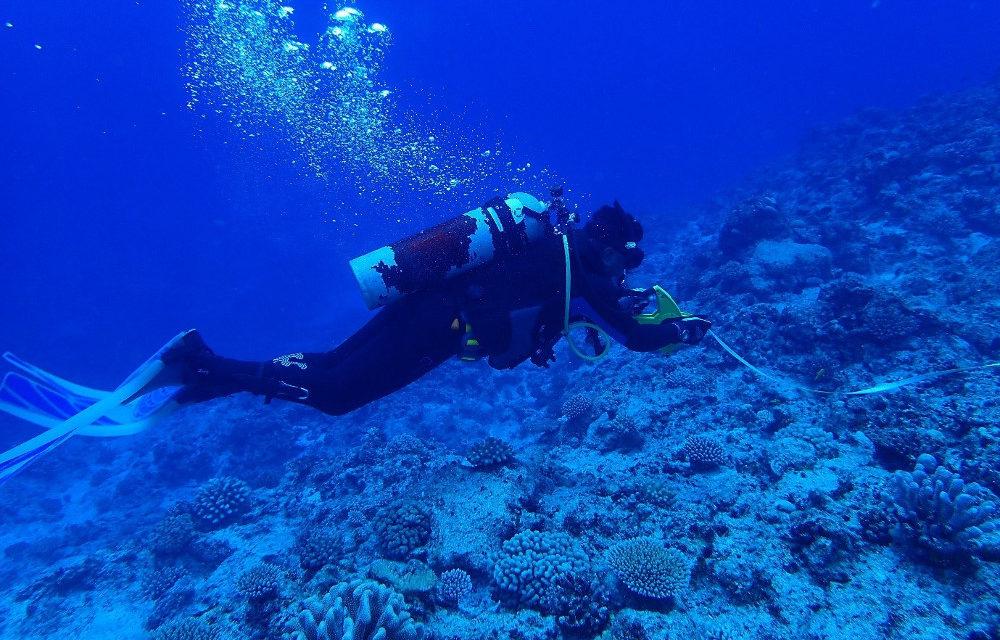Navneel Singh, PIJP from Fiji, doing underwater surveying. Photo credit: Pauline Bosserelle
In 2013, the Coastal Fisheries Programme (CFP) created a new position of ‘Pacific Islander Junior Professional’ (PIJP) to enable young Pacific fisheries staff to access professional development opportunities by working at SPC and supporting the delivery of the work programme. From 2013 to 2016, eight PIJPs completed a term with CFP. In 2017, the programme was expanded to include an additional five positions across both CFP and the Oceanic Fisheries Programme (OFP) for the first time. A total of 13 PIJPs have been recruited since 2013.
The roles are internationally recruited positions with a 12 month term, attractive salary and other benefits. Requirements are as follows:
- Only applicants who are nationals and residents of PICTs are eligible to apply.
- Applicants must be employed in or contracted by a Pacific Island fisheries department or equivalent agency, and actively working in the field of fisheries science, fisheries policy or other technical aspects of fisheries management.
- Applicants must have their employer’s agreement to release them for 12 months and reinstate them following the completion of the contract, with a signed letter of endorsement.
In March 2017, the Tenth Heads of Fisheries meeting ‘acknowledged CFP’s ongoing commitment to the Pacific Islander Junior Professional programme, and supported OFP’s move to recruit a similar position’. Despite this, implementation of the programme has not been without challenges. During the five years it has been operating, the programme has undergone continuous improvement and adaptation in response to feedback and lessons learned from PIJPs, their SPC supervisors and their own agencies. As funding for the PIJP programme comes from a range of sources, planning and prioritisation have been necessary to build a sustainable programme in response to growing demand.
To date there have been 13 PIJPs (8 past and 5 current). Most have been in CFP, with the programme being expanded to include three current positions in OFP. PIJPs have been from Fiji (3), Kiribati (1), Niue (1), PNG (2), RMI (1), Samoa (2), Tuvalu (1) and Vanuatu (2). Six of the 13 PIJPs have been women, with gender being a consideration during recruitment to promote and support equitable opportunities for women in fisheries.
As part of strengthening internal MEL processes, and because the programme had grown, an independent review was commissioned in 2017. In particular, while the programme was continuously adapted in response to learning, there was limited follow-up of past PIJPs to assess the longer-term impact of the programme.
The review found that PIJPs found the experience both challenging and rewarding. Difficulties included the stress of arriving in a new country and concerns about lack of oversight and guidance in some cases. Most seemed to take considerable satisfaction from the role, and all felt positively towards SPC. Most have remained in the fisheries sector in the region.
The review also found that SPC has adapted the programme in response to some of the issues experienced by PIJPs by providing more support for settling in, better mentoring and a ‘buddy’ system; moving from a strong focus on ‘professional development’ to a more work-focused approach; and broadening the programme to include a range of areas.
In relation to longer-term impact, participants spoke positively about applying the knowledge learned at SPC to their current roles:
‘My experience has been vital in leading and assisting in conducting training, collecting data, doing monitoring and evaluation of data collection.’
‘They [workplace] really appreciated and acknowledged the skills I brought back to the organisation.’
For one, implementing a national survey on returning home was the ‘biggest accomplishment out of SPC work … I produced the report directly using what I learned at SPC’.
As noted in the review, the most positive outcomes were the increased confidence of PIJPs in their ability to deliver technical work and to face the challenges presented by working in new environments.
Lessons learned
In short-term project funding environments, it can be difficult to implement division-wide initiatives such as the PIJP programme. Including it as a priority and a formal part of the work programme has assisted in planning for PIJP positions and ensuring sustainability through using a combination of project funds where projects have had capacity development components, and programme funding.
While it might seem counterintuitive to spend limited MEL resources on reviewing the evidently successful PIJP programme, the expansion of the programme in 2017 was seen as an opportune time to invest in conducting follow-up interviews with past PIJPs, to learn from their feedback and further improve the programme design and implementation.
Similarly, while MEL and innovation considerations are often limited to project-specific activities, shared priorities like the PIJP programme provide an opportunity for division-wide review, adaptation and learning, and the assessment of longer-term impacts after projects have ended.
